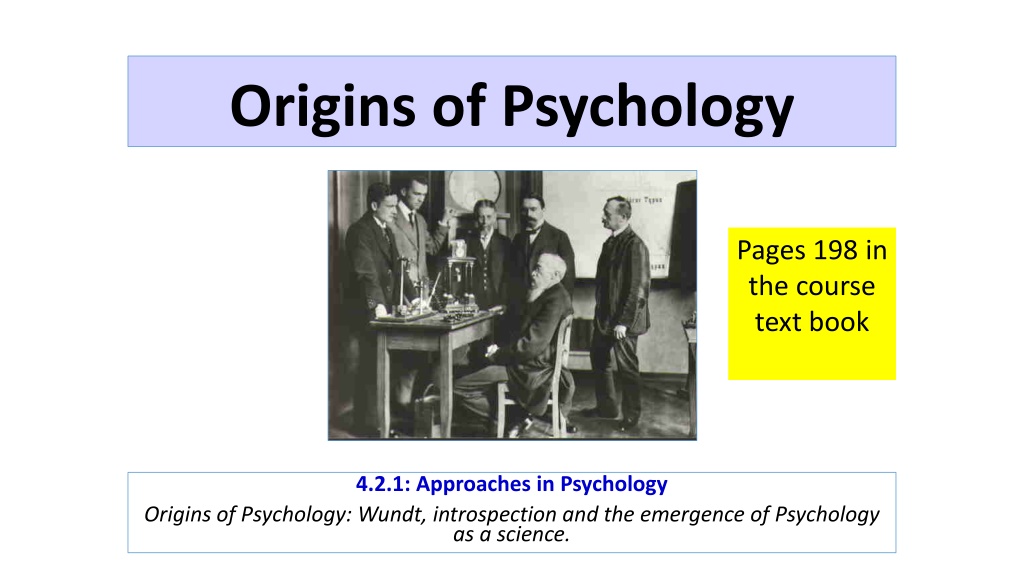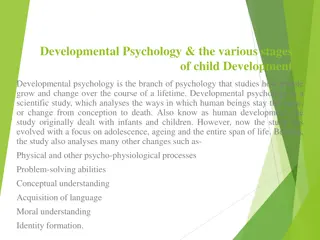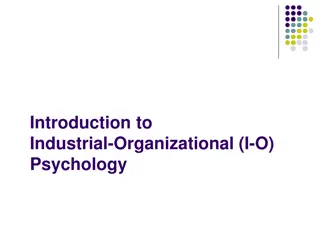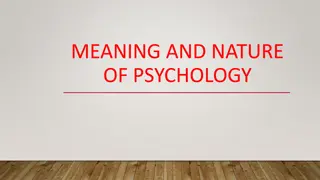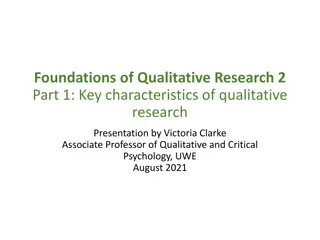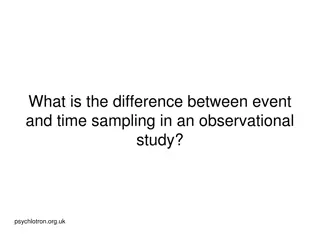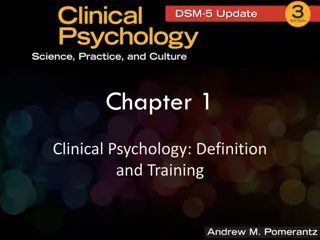Origins of Psychology: From Wundt to the Emergence of a Science
Psychology, emerging in 17th to 19th century philosophy, shifted from experimental philosophy to a science. Influenced by Descartes, Locke, and Darwin, it explored the mind-body connection, empiricism, and evolutionary theories. Wilhelm Wundt, termed the father of psychology, pioneered the field by establishing a structuralist approach and using introspection as a method of investigation. His work laid the foundation for the scientific study of human behavior and the development of various psychological perspectives.
Download Presentation

Please find below an Image/Link to download the presentation.
The content on the website is provided AS IS for your information and personal use only. It may not be sold, licensed, or shared on other websites without obtaining consent from the author. Download presentation by click this link. If you encounter any issues during the download, it is possible that the publisher has removed the file from their server.
E N D
Presentation Transcript
Origins of Psychology Pages 198 in the course text book 4.2.1: Approaches in Psychology Origins of Psychology: Wundt, introspection and the emergence of Psychology as a science.
What is science? Think-pair-share With the person sitting next to you, discuss what science means what do you see as the criteria for classification as a science?
The beginning? In contrast to the natural sciences (physics, chemistry and biology), Psychology is a relatively new scientific discipline. It has its roots in 17th and early 19th century philosophy and was indeed once known as experimental philosophy. Early influences included Rene Descartes, and his concept of Cartesian dualism, which simply means that the mind and body are separate entities, the brain is not the same as the mind. This is a clear starting point for psychology.
The beginning The work of John Locke and his concept of empiricism, the belief that all knowledge is derived from sensory experience and can be studied using the scientific method also had an influence on the emergence of psychology as a science. Finally, the evolutionary theories of Charles Darwin set the stage for the emergence of psychology as we know it today.
History of Psychology More on this next time
Wilhelm Wundt In 1873 Wilhelm Wundt published the first book on psychology Principles of Physiological Psychology and in 1879 opened the first psychology laboratory in Leipzig, Germany. He is often considered to be the father of psychology His approach to psychology was to study the structure of the human mind, by breaking down behaviours into their basic elements, hence his approach became known as structuralism.
Introspection Wundt used introspection to investigate the human mind. Introspection comes from Latin and means looking into . Basically, participants were asked to reflect on their own cognitive processes and describe them. Wundt established psychology as a science by using the scientific method his ideas would lead to multiple different psychological perspectives.
What is the Scientific Method? Wundt s new scientific approach to psychology was based on two major assumptions. 1. All behaviour is seen as being caused (determined) 2. If behaviour is determined, then it should be possible to predict how human beings would behave in different conditions (predictability) This technique used to explore these assumptions became known as the scientific method
What is the Scientific Method? The scientific method refers to the use of investigative methods that are: objective systematic replicable are they important? How are these achieved and why
Evaluating the scientific approach to psychology Strengths: Knowledge acquired using scientific methods are more than just the passive acceptance of facts Causes of behaviour can be established through the use of methods that are empirical and replicable Scientific knowledge is self- corrective meaning that it can be refined or abandoned Weaknesses: Scientific psychologists create contrived situations that create artificial behaviours Much of the subject matter of psychology is unobservable, therefore cannot be measured with any degree of accuracy Not all psychologists share the view that that human behaviour can be explored through scientific methods Discuss with your partner the strengths and weaknesses of using the scientific approach in psychology
Introspection Introspection relies primarily on non-observable responses and although participants can report conscious experiences, they are unable to comment on unconscious factors relating to their behaviour. Introspection produced data that was subjective (varied greatly from person to person), so it became very difficult to establish general principles. This means that introspective experimental results are not reliably reproduced by other researchers. In contrast, the early behaviourists such as Pavlov and Thorndike were achieving reliably reproducible results and discovering explanatory principles that could be easily generalised to all human beings
Introspection Introspection may not seem particularly scientific, but it is still used today to gain access to cognitive processes. For example, Griffiths (1994) used introspection to study the cognitive processes of fruit machine gamblers. He asked them to think aloud whilst playing a fruit machine into a microphone on their lapel. Csikzentmilyi and Hunter (2003) used introspection to study happiness in their work in the area of positive psychology.
Psychology as a science Psychologyhas four goals: 1. Description tells us what occurred 2. Explanation tells us why a behaviour or a mental process occurred 3. Prediction identifies conditions under which a future behaviour or mental process is likely to occur 4. Change applies psychological knowledge to prevent unwanted behaviour and to bring about desired change
The BIG but. Lets have a look at an exam question . What s in the textbook? What s on the mark scheme? What is missing? What will you need to do about it?
Homework Secret Agent Mission Overview of different approaches in Psychology Your mission, which is compulsory to accept, is to uncover the secret agent file stowed in the Psychology section of the main Roedean School library. Upon finding this item, your task is to research one approach in psychology that you will be studying this year, and outline a key researcher associated with this approach. You must then leave details of your investigations for inspection. This message simply won t self destruct; we know, because we tried it. Special Agents Alexander and Rose
Approaches within Psychology Approaches (sometimes called perspectives ) can be seen as different ways of explaining psychological phenomena Year one: Biological approach Learning approach (Behaviourist and Social Learning Theory) Cognitive approach Year two: Psychodynamic approach Humanistic approach
Why are there different approaches in psychology? Each approach looks at human behaviour from a different perspective. They all contribute to our understanding in different ways. For example the biological approach shows us how genetic factors might contribute to some mental disorders, whereas the learning approach helps us to understand how we learn behaviours through experience. No approach is right and the others wrong but some are more useful than others depending on what we try to explain.
Stretch and Challenge 1. Explain Wundt s contribution to the development of psychology 2. Outline one criticism of Wundt s contribution to psychology 3. Explain what is meant by introspection 4. Outline two criticisms of introspection as a method of investigation 5. Explain the emergence of psychology as a science 6. Outline one strength and one limitation of the scientific approach in psychology Answer the Check it questions on page 105 in the GHG e-textbook
